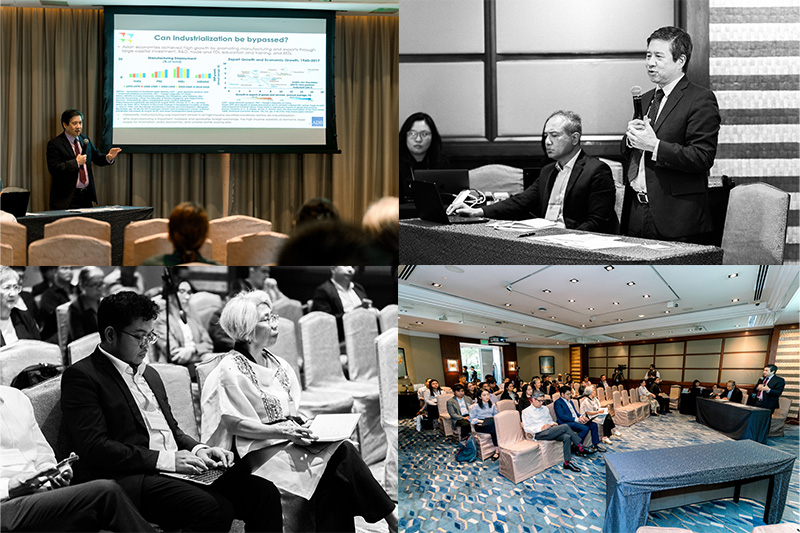The current system of selection under the Shared Service Facilities (SSF) Program of the Department of Trade and Industry (DTI) could be prone to abuse and misuse, according to a paper by the Philippine Institute for Development Studies (PIDS).
In a discussion paper, titled Preliminary Assessment of the Shared Service Facilities, the team of researchers, led by PIDS senior research fellow Erlinda M. Medalla, found that a more transparent system is needed in selecting projects.
“Notwithstanding the sound judgments shown by DTI personnel, conscious effort should still be exerted in making the selection process more transparent to sidestep the slightest hint of abuse and personal biases,” the paper stated.
The authors said the predetermined selection procedure under the SSF can be “misused to favor certain establishments.”
The current system, the PIDS researchers said, the projects proposed under the SSF are usually below P1 million and can easily be identified at the regional or provincial level.
While this allows more projects to be approved and undertaken within a shorter time period, it could lead SSF to only take on projects that are less substantive that may lack value addition.
“To discourage preference for small projects with minimal impact on productivity, there might be a need to increase the threshold of project costs under the control of provincial or regional offices,” the authors said.
Apart from this, the PIDS research team found that cumbersome requirements of national agencies, such as the Bureau of Internal Revenue, have led to delays in SSFs.
Further, delays were also caused by DTI’s lack of technical capability, particularly in terms of properly identifying the technical specifications of requested facilities and equipment.
The PIDS researchers added that there were suggestions to develop a database of all existing (both accredited and nonaccredited) suppliers with information regarding their technical experience.
This database should also include the capability in fabricating production equipment, as well as some important technical information regarding the equipment they manufacture.
“Indeed, much of the delays encountered by program implementers are, in so many ways, affected by existing procurement rules. All too often, the rightful suppliers shun government accreditation because of cumbersome requirements,” the researchers said.
As of the October 4, 2014, data, the DTI was able to utilize 53.63 percent of the funds allocated for SSF. Of this amount, some 41 percent, or P290.3 million, was established and 12 percent, or P85.2 million, was obligated.
Among the regions, Region 3 had the biggest fund allocation at P115.3 million; next was CAR with P74 million; and third was Region 4A, which has P70.5 million fund allocation for SSF. Region 6 had the lowest share with P19 million, which is roughly 2.7 percent of the total allocated fund for 2013.//
In a discussion paper, titled Preliminary Assessment of the Shared Service Facilities, the team of researchers, led by PIDS senior research fellow Erlinda M. Medalla, found that a more transparent system is needed in selecting projects.
“Notwithstanding the sound judgments shown by DTI personnel, conscious effort should still be exerted in making the selection process more transparent to sidestep the slightest hint of abuse and personal biases,” the paper stated.
The authors said the predetermined selection procedure under the SSF can be “misused to favor certain establishments.”
The current system, the PIDS researchers said, the projects proposed under the SSF are usually below P1 million and can easily be identified at the regional or provincial level.
While this allows more projects to be approved and undertaken within a shorter time period, it could lead SSF to only take on projects that are less substantive that may lack value addition.
“To discourage preference for small projects with minimal impact on productivity, there might be a need to increase the threshold of project costs under the control of provincial or regional offices,” the authors said.
Apart from this, the PIDS research team found that cumbersome requirements of national agencies, such as the Bureau of Internal Revenue, have led to delays in SSFs.
Further, delays were also caused by DTI’s lack of technical capability, particularly in terms of properly identifying the technical specifications of requested facilities and equipment.
The PIDS researchers added that there were suggestions to develop a database of all existing (both accredited and nonaccredited) suppliers with information regarding their technical experience.
This database should also include the capability in fabricating production equipment, as well as some important technical information regarding the equipment they manufacture.
“Indeed, much of the delays encountered by program implementers are, in so many ways, affected by existing procurement rules. All too often, the rightful suppliers shun government accreditation because of cumbersome requirements,” the researchers said.
As of the October 4, 2014, data, the DTI was able to utilize 53.63 percent of the funds allocated for SSF. Of this amount, some 41 percent, or P290.3 million, was established and 12 percent, or P85.2 million, was obligated.
Among the regions, Region 3 had the biggest fund allocation at P115.3 million; next was CAR with P74 million; and third was Region 4A, which has P70.5 million fund allocation for SSF. Region 6 had the lowest share with P19 million, which is roughly 2.7 percent of the total allocated fund for 2013.//











